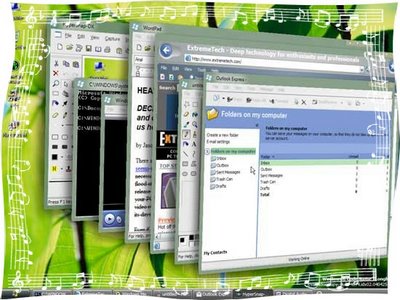Wednesday, September 06, 2006
The Seven Flavours Of Windows Vista

Starter Edition:
First up is the Vista Starter Edition. It can be compared to the currently available Windows XP Starter Edition. Users working on SE will be restricted to running only three applications. As for networking capabilities, only the basics will be on offer.
Home Basic Edition:
Most users, who do not need the extra features of Windows XP Professional like the ability to host a web server and so on, have opted to choose the WinXP Home Edition. The reason being its lower price and adequate features for the home user. Vista’s HBE will fall into this category and should be a steal if it is priced lower than what Win XP Home Edition sells for today.
Home Premium Edition:
This version of Vista ought to be viewed as the Home Basic Edition, but with some extra oomph added to it. The features on offer will include higher-order Media Centre capabilities and support for HDT and DVD authoring. The OS will also enable users to rip DVD discs through Windows DRM (Digital Rights Management).
Windows Vista Professional Edition:
Unlike WinXP Pro, Vista Professional Edition is meant for businesses. The useful bit is that the OS will support non-Microsoft networking protocols and domain support. Small Business Edition: This edition will offer features provided by the Vista Professional Edition and will also include a networked backup solution.
Enterprise Edition:
The Enterprise Edition will include features like Virtual PC integration, and the ability to encrypt an entire volume of information. Such security features will be of great use for enterprise level users.
Ultimate Edition:
Much like the name suggests, Windows Vista Ultimate Edition will include the best from both Vista Home Premium and Vista Pro Editions. It is meant for high-end enthusiastic PC users, which also include gamers and digital media enthusiasts.
But that’s not all, what it will also include is something called the Game Performance Tweaker, which will enable the user to enjoy an integrated gaming experience. It is also rumoured that a Podcast creation utility might also be included. The OS will also provide a service called the online ‘Club’. This service will give Ultimate edition owners access to exclusive music, movies, services and customer care. At the end of the day, of all the versions that promise to hit the shelves, the Ultimate Edition sounds the most appealing. What with new features and addon services like exclusive music downloads and so on. On the basic usage front, the Home basic Edition should be a hit, if priced competitively. Businesses should be able to take advantage of features like networked backup solution, which the Small Business Edition should offer.

